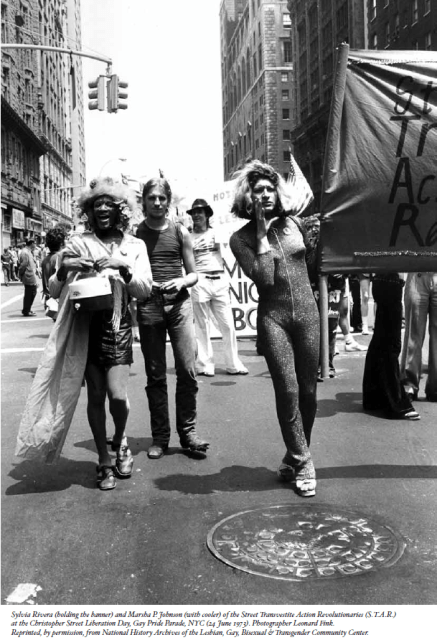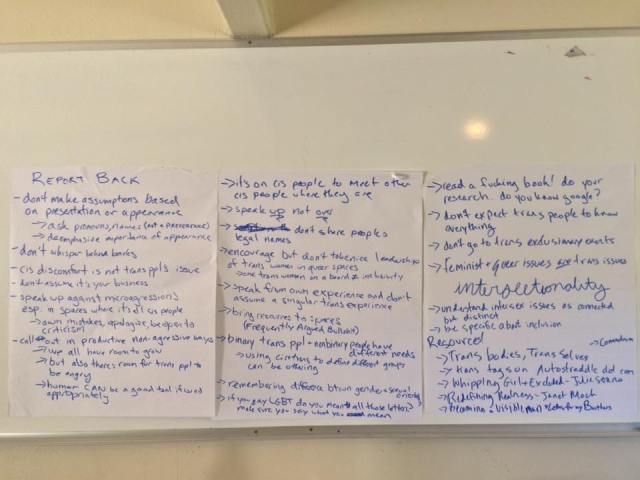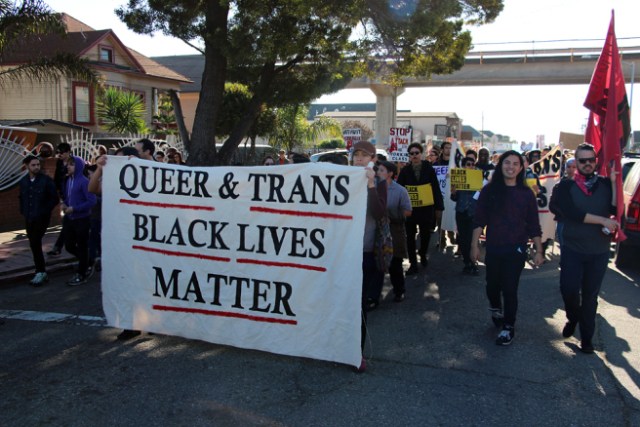
16 Ways to Make Queer Women’s Spaces More Trans Women-Friendly
Feature image via Shutterstock
When I first came out just a few years ago and started entering queer women’s spaces, I often found that I wasn’t greeted with the open arms that I expected. While some meetups and organizations and groups didn’t actively say that trans women like me weren’t welcome, they did other things, often microaggressions or acts of casual transmisogyny, that made it clear that they didn’t really care if I felt like I belonged or would want to come back. I’m sure I’m not alone in feeling that way.
Aside from being hurt and angry, this left me feeling very confused. I thought that queer women’s spaces were supposed to be welcoming for a woman like me. After all, I’m a woman, I’m a lesbian, I’m queer. These spaces were supposed to be the one place where I didn’t have to worry about everyone else judging me and saying that I didn’t belong.
As trans people have gained more prominence in culture and trans women, and especially trans women of color have started demanding that our voices are heard, things are getting better. But I still notice things, even in groups and spaces that claim to be completely “trans-friendly.” With all that in mind, I got together with Morgan, KaeLyn and Maddie (who are leading an A-Camp Workshop on this subject with me) to make this list of ways to make sure that queer women’s spaces continue to become even more welcoming and affirming to the trans women who so rightfully belong there.
1. Don’t Talk About Menstruation as if It’s the Ultimate Sign of Womanhood
Making bleeding into the essence of womanhood is a super easy way to make trans women feel like they don’t belong. For example, I hear this kind of thing all the time when people talk about witches, they make statements like, “all women are witches because all women bleed” or “we are witches because our bleeding connects us to the moon.” I’m a witch (and a woman) too. — Mey
Menstruating humans: you can still talk about menstruation, but don’t generalize or assume everyone bleeds once a month. Use I-statements! Even amongst people who do menstruate, it’s not like it’s a singular or uniform experience. By speaking from your personal experience, you help create space for other people to share their related personal experiences, whatever those may be. This creates richer conversations and opens more possibilities for everyone to learn. — Maddie (Yes! Thank you for adding this, Maddie! — Mey)
2. Make Sure You Center TWOC
Also, make sure that you’re centering all of this on TWOC, and usually more specifically, on Black trans women. So much of our history is because of them, and so much of our present oppression is aimed at them. When you’re having a Trans Day of Remembrance event, white trans people and trans men probably shouldn’t be your first choice for speakers. It’s Black and Latina trans women who are murdered, so if you continue to erase them, you’re not helping as much as you think you are. — Mey
3. Even though they’re sometimes cute and funny, think twice before using essentialist slogans like “Ovaries before Brovaries”
I like the sentiment, I’m always here for choosing women over men, but things like this or “uteruses before duderises” can make trans women feel left out. I love you, Leslie Knope, but you can do better. — Mey
I cringe every time someone associates “lesbian” or “queer woman” with “penis-hater” as a stand in for “doesn’t make sexy times with men.” Let’s not assume all women have vaginas and all queer women only have sex with people with vaginas. — KaeLyn
4. Don’t assume only people who are pansexual or queer date trans women
Seriously, I hate it when people say things like, “Pansexuality means attraction to men, women and trans people.” Trans women are women, so if you’re attracted to cis women and trans women, that doesn’t automatically make you something other than a lesbian. — Mey
5. If you say something is “LGBTQ” make sure it’s not just “LGBQ”
People are getting better with this, but I still see online articles talking about the “LGBT” community that don’t mention trans people once. A similar thing that’s equally annoying is when things are labelled “Gay and Lesbian” that include straight trans people, like when Netflix calls Boys Don’t Cry and Gun Hill Road “Gay and Lesbian” movies. — Mey

Marsha P. Johnson, Sylvia Rivera and others marching. via masstpc.org
6. If you’re talking about queer history, talk about trans history
I can only really talk about the US here, because that’s all I really have a lot of knowledge about, but when you talk about the history of the movement, make sure you talk about how it was started by trans women of color. Sylvia Rivera and Marsha P. Johnson, a Latina trans woman and Black trans woman were two of the first people to fight back, and Miss Major Griffin-Gracy is a living trans elder who was also a leader in the riots. — Mey
7. Do your research
Use Google! Before you decide to bother your one trans friend by asking her a million questions about what different terms mean, do your own research! I’ve encountered several people who tell me, in person, that they want to make their group or event trans-friendly, and they’re trying to, but they’re “afraid of saying something offensive” because they don’t know what all the best terms are. If you just google it, there are tons of articles talking about how to talk about and to trans people. — Mey
(Need someplace to start? Here are some Autostraddle articles you might find useful: Please Stop Saying That Trans Women Were “Born Boys”, Getting With Girls Like Us: A Radical Guide to Dating Trans* Women for Cis Women, Remembering Us When We’re Gone, Ignoring Us While We’re Here: Trans Women Deserve More, So You Can Fuck Us; What’s Next? Going Beyond Sex With Trans Women)
7. Be trans-inclusive all the time — don’t make it something you “turn on” once you know a trans person is in a space
If you are in a group of people who all identify as cis, don’t let it be a reason to pretend trans people don’t exist anywhere. You can still practice being trans-inclusive in your language and gently and productively addressing cissexism and cisnormativity. ALSO, cis people, if your family members are down with the Gay, but don’t really understand trans issues, teach them! I’ve found this to be a longer and harder concept for them to understand than my coming out as queer ever was, but it’s made all of us better allies and it’s also strengthened our relationships. — Maddie
Adding on to what Maddie says: when I came out to my folks/etc., my goal wasn’t to try and cover every topic about being trans under the sun. Just what they needed to know then. No conversation had with anyone about anything covers all that needs saying. Take your time. You can’t teach people to have conversations about things if you only speak to them as a one-time monologue. — Morgan
8. Use trans-inclusive language
You can do this in your event descriptions, promotional materials, etc. — Morgan
9. You can be trans-inclusive without outing people
I’ve had the experience of people showing my modeling pics to people I don’t know and outing me as trans. I’ve also been through a workplace training about trans issues and needed to remind people that you can take this education to your life/clients/etc. without being like, “Oh yes, we have a trans too!” Outing people without their consent is a safety issue. — Morgan
Yes! This reminds me of that scene in Transparent where Maura is going shopping with her daughters and they’re trying to use a public bathroom and a girl in there says something transmisogynistic to Maura, but then Sarah just makes it worse by loudly calling Maura her dad, letting everyone in there know that she’s trans. — Mey
Most especially, cis folks dating trans folks, don’t out your trans partner to gain queer or feminist credibility or trans ally points. Some trans folks are out 100% of the time and might feel comfortable with their partner talking about them as out. With your partner’s 100% explicit permission, it might be OK, but even then, think hard about whether it is important to do and why you are doing it. Don’t make your partner’s gender about you, ever. You can promote trans-inclusivity without outing your partner to gain credibility. – KaeLyn

via Shutterstock
10. When setting up at an event space, slap gender neutral bathroom signs on the male and female bathroom doors
But also, don’t only do this when you have an event with binary-identified trans people. When people tell me that they’ve changed the women’s bathroom into a gender neutral one because I or another trans woman was going to be there, I feel like it sends the message that trans women aren’t real women or don’t fully belong in women’s spaces. — Mey
If they already exist and are accessible, tell people where existing gender neutral and/or single stall restrooms are when your make bathroom announcement. Let everyone know, not just trans people you know are in the room. “Men’s restroom is over there. Women’s restroom is over there. GN and/or single stall restrooms are over there.” — KaeLyn
11. Don’t make things worse when you’re trying to make them better
If you see instances of transphobia, cissexism/centrism/normativity/etc., do not call it out in abusive or confrontational ways (which don’t do any good), do not create a judgment space, but use this as an opportunity for open and genuine discourse. — Morgan
This especially goes for cis people calling out other cis people. Don’t capitalize on instances of transphobia/misogyny cissexism/centrism/normativity as an opportunity to win social justice warrior points. You probably needed to learn whatever this person needs to learn at some point, so meet them where they’re at and help them learn what they need to know. Have a discussion. — Maddie
It is not up to trans people to educate cis people, but trans people are often expected to answer cis people’s very Google-able questions. Cis allies are in a position of systemic power and can use that cis privilege for good by educating other cis people (and especially explaining why it’s not cool to keep asking trans people invasive and offensive questions and maybe show them how Google works). — KaeLyn
I was doing the activism thing for awhile, inviting all the questions, answering all the questions. I was approaching burnout. Then someone told me something that I had never heard before, never knew was allowed: “Morgan, you have the right not to educate someone. You have the right to not fight the fight.” I got so fixated on making things better for others that I made it worse for me. Know your limits, and if you don’t, keep an eye out for them. — Morgan
12. Gender inclusiveness is not a one-off event and then it’s all worked out; it’s something you need to continue to plan new topics for as time goes on
See cuz the program obvi isn’t just for trans people to feel safer, it’s for you to interact with the world in a more knowledgeable way. And maybe help cis people come to terms with gender feelings they didn’t realize they had. — Morgan
13. All feminist concerns are transgender concerns, period
…and if your feminism doesn’t have space for transgender issues, ask yourself why and think about how you can make your feminism trans-inclusive. — Maddie
…and trans women’s experiences are women’s experiences, period, and are part of feminist experience and discourse. — KaeLyn
14. Don’t just wait and hope trans people will come to you
Reach out to trans people/organizations in your area to facilitate discussions and further the goals of both groups/organizations by facilitating dialogue and unity. Go to trans people rather than waiting for them to show up on your doorstep. — Morgan
Groups often lament that they “need more _____” at the table. Black people, nonblack POC, young people, trans people, directly affected people, etc. Well, great. You’ve identified the empty seats. But don’t expect trans people to come to your table that was built for and by cis people. You have to engage trans people respectfully and create a new trans-inclusive table together. — KaeLyn
15. Support creating space for trans-centered spaces and discussions in women’s space and then step back and let those spaces center on trans women
Taking up all the air in trans spaces with your cis voice is a really disruptive and disrespectful thing to do, even if you are invited to be there. Especially if you are invited to be there. Don’t make a trans space about your cis voice. Sit back and listen and appreciate that you were trusted to be present. If you are going to insert your voice into a trans conversation and want to do so respectfully, use it to amplify the voices of trans people. For example, if you are joining a #translivesmatter tweet-up, retweet trans people and tweet out trans leaders, authors, activists. Again, listen and step back and keep the conversation centered on trans people and trans voices. – KaeLyn
16. Remember that trans people and trans politics contain multitudes
One trans person can’t speak for all trans people, and there are different trans politics that can contradict each other. This is another reason why it’s important to look at trans and gender-inclusivity as an ongoing process rather than a one-time checklist: it’s part of a living and growing discourse about how to create a world where trans liberation and gender self-determination can exist, intersecting with and incorporating racial, economic and disability justice. — Morgan

The list our workshop came up with at A-Camp 2015.
We also came up with this list as a group at A-Camp. Some of them are already covered here on this list, but here they are:
- Don’t make assumptions based on presentation or appearance. Ask pronouns/names (not a preference). De-emphasize the importance of appearance.
- Don’t whisper behind backs
- Cis discomfort is not trans people’s issue
- Don’t assume it’s your business
- Speak up against microaggressions, especially in spaces where it’s all cis people. Own your mistakes, apologize and be open to criticism.
- Call out in productive, non-aggressive ways. We all have room to grow, but also there’s room for trans people to be angry and humor can be a good tool if used appropriately.
- It’s on cis people to meet other cis people where they are
- Speak up, not over
- Don’t share people’s legal names
- Encourage but don’t tokenize leadership of trans women in queer spaces. One trans woman on a board doesn’t equal inclusivity.
- Speak from your own experience and don’t assume a singular trans experience
- Bring resources to spaces (Frequently Argued Bullshit)
- Binary trans people and non-binary trans people have different needs. Using “cis and trans” to define different groups can be othering.
- Remember the difference between gender and sexual orientation.
- If you say LGBT do you mean all those letters? Make sure you say what you mean.
- Read a fucking book! Do your research. Do you know google?
- Don’t expect trans people to know everything
- Don’t go to trans exclusionary events
- Feminist and queer issues are trans issues.
- INTERSECTIONALITY
- Understand intersex issues as connected but distinct
- Be specific about inclusion
- Resources
- Trans Bodies/Trans Selves
- Trans tag on Autostraddle
- Whipping Girl and Excluded by Julia Serano
- Redefining Realness by Janet Mock
- Becoming a Visible Man by Jamison Green and Letters for My Brothers
Of course this list is incomplete; we’re just a few people with a few ideas, and we don’t cover every experience or type of person, so you can be sure we’ve missed some things. If you have other ideas, please add them in the comments.

